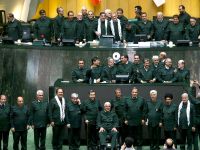A state security court indicted the head of one of Turkey's most powerful Muslim organizations Thursday on charges of plotting to overthrow the country's secular state, Anatolia news agency reported.
The prosecutor demanded a 10-year prison sentence against Fethullah Gulen, the leader of the most influential faction of the Nur or "Light" brotherhood, for "establishing and running an illegal organization to undermine the state's secular order and replace it with a state based on religious rules."
The indictment was based on an anti-terrorist law under which 63-year-old Gulen, who is currently in the United States where he has been receiving medical treatment for more than a year, can be jailed for between five and 10 years.
Gulen will be tried in absentia.
Gulen's brotherhood, generally considered a moderate Islamic group, has gained popularity in large part through several hundred schools it runs in Turkey, Central Asia and the Middle East.
The indictment said the movement was "the strongest and most influential reactionary establishment in Turkey," which penetrated to state offices in a "well-covered and sly" manner, disguising itself as a moderate, pro-democracy group.
One of its main targets was to infiltrate the army, a staunch defender of secularism, the charges said.
In order to attract followers, Gulen's brotherhood "brainwashed" young people in its schools and boarding houses, the prosecution said, adding that the group ran 88 foundations, 20 associations, 128 schools, 218 companies, some 500 boarding houses, 17 publications, a large media group and two financial institutions in Turkey alone.
The probe into Gulen was opened after a Turkish TV station broadcast in June a tape of the Islamist giving an address to "our friends in the judiciary and public administration," in which he allegedly called on his followers to undermine the state and work for the establishment of a religious order.
Gulen, in a statement issued from the United States, said the tape was a forgery.
Last week, a state security court withdrew an arrest warrant for Gulen, but the prosecution still went ahead with its indictment.
Gulen has maintained close relations with businessmen, politicians and journalists, and met Pope John Paul II last year.
Even left-wing Prime Minister Bulent Ecevit, a devoted supporter of Turkey's secular system, has praised Gulen's schools as a contribution to the promotion of Turkey abroad.
Following the initial arrest warrant for Gulen, Ecevit said he did not want to meddle in justice, but expressed his "personal" regret at the decision.
Ecevit's stance came under fire from the press, which accused him of double standards at a time when he has pushed unsuccessfully for the adoption of a decree aimed at firing public servants deemed to have links with subversive Islamist and Kurdish movements.
Since 1997, Turkey has been carrying out a massive crackdown against political Islam, which the country's powerful military deems the major threat to the country's secular order – ANKARA (AFP)
© 2000 Al Bawaba (www.albawaba.com)







